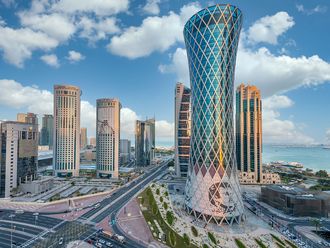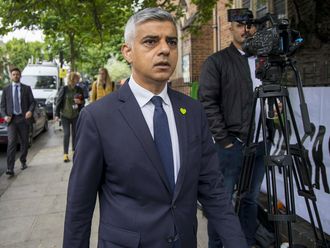Manama: Bahrain, Saudi Arabia, the United Arab Emirates and Egypt have stressed the importance of Qatar responding to the demands presented as a way to resolve the crisis that emerged in the open on June 5.
The Quartet foreign ministers meeting in the Bahraini capital Manama on Sunday said that Qatar needed to respond to the 13 demands in order to reinforce the combat against terrorism and extremism to ensure the security and stability of the region and the world.
At their press conference following their meeting, the foreign ministers said that the six principles announced at the Cairo meeting represented the stance of the international community towards fighting terrorism and extremism and their funding, the rejection of interference in the domestic affairs of other countries and which clash with international laws, and the significance of implementing the 2013 and 2014 Riyadh Agreements signed by Qatar, but without putting them into practice.
The ministers said they were ready to engage in discussions with Qatar if it expressed its “genuine desire to implement the Quartet’s demands.
“Qatar must stop funding terrorism, interfering in the internal affairs of other countries and inciting hatred and must adhere to regional and international agreements,” Shaikh Khalid Bin Ahmad Al Khalifa, Bahrain’s foreign minister, said.
The Quartet ministers said their countries condemned the deliberate stalling by Qatar of the pilgrimage (Haj) procedures for Qatari nationals, while they praised the facilities provided by the Saudi government for all pilgrims.
“We reject Qatar’s attempts to politicise the entry of Qatari pilgrims to the kingdom,” Adel Al Jubeir, Saudi Arabia’s foreign minister, said.
The ministers said they deeply valued the role of Kuwait’s Emir Shaikh Sabah Al Ahmad in mediating for a settlement of the crisis with Qatar.
“The real [mediation] role has been since the beginning that of His Highness the Emir of Kuwait, and everybody supports it and we pray for its success,” Shaikh Khalid said.
Officials from the four countries have often said that the crisis would be settled through a Gulf solution, ruling out any role for foreign mediations.
Shaikh Khalid said that there could be no “optimism” about the settlement of the crisis until Qatar responded to the demands.
“The crisis with Qatar is very significant for the stability of the region, and we are keen on resolving it. We want Qatar to respond to the demands. Then, we can talk about optimism. However, any talk about optimism right now without hearing a clear stance from Qatar on the crisis that it has caused would be premature. We will be optimistic once we see the practical measures taken by Qatar,” he said.
Earlier Report
DUBAI: Saudi Arabia, Egypt, the United Arab Emirates (UAE) and Bahrain are expected to discuss imposing new economic sanctions on Qatar when they meet in the Bahraini capital Manama on Sunday, the pan-Arab al-Hayat newspaper reported.
The four Arab states cut ties with Qatar on June 5, accusing it of backing terrorist groups and cozying up to their arch-foe Iran, allegations Doha denies.
Foreign ministers of the four countries "are expected to impose sanctions that will gradually affect the Qatari economy", Al Hayat newspaper said, citing unidentified Gulf sources, without giving any further details.
READ MORE:
Qatar and the 'money diplomacy strategy'
UAE: Changes to Qatar anti-terror law positive
Qatar-linked individuals, groups involved in terrorism
Qatar’s lack of responsibility, accountability criticised
More revelations of Qatar’s plots in Libya
Al Jazeera: How it incites terror, hatred
Crisis: Qatar fails to grasp the reality
Qatar’s shrinking options from its rigid stance
Poem urges Qatar to 'return to GCC'
Bahrain's state news agency BNA said on Saturday that King Hamad bin Isa al-Khalifa had hailed cooperation between the four countries in fighting terrorism.
Diplomatic efforts led by Kuwait and involving the United States and Turkey have failed to end the row, which has affected travel and communications between Qatar and the four countries and led to harsh verbal exchanges in the media.
Saudi Arabia has closed its land border with Qatar while all four countries have cut air and sea links with Doha, demanding the gas exporting country take several measures to show it was changing its policies.
Turkey and Iran have stepped in to provide fresh produce, poultry and dairy products to Qatar instead of Saudi Arabia and the UAE, with Oman providing alternative ports to those in the UAE.
The four Arab countries added 18 more groups and individuals they say are linked to Qatar to their terrorist lists last week.












